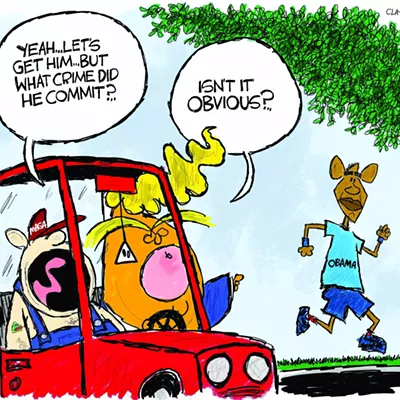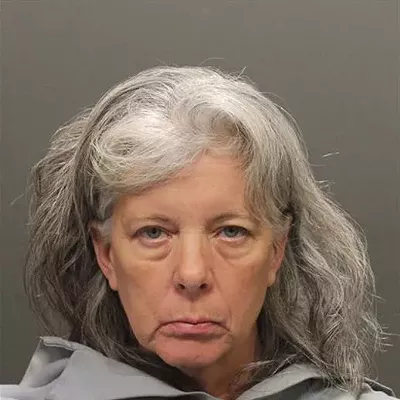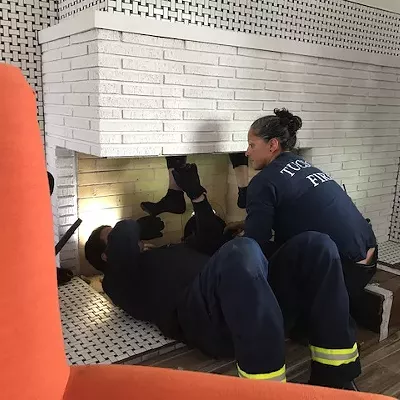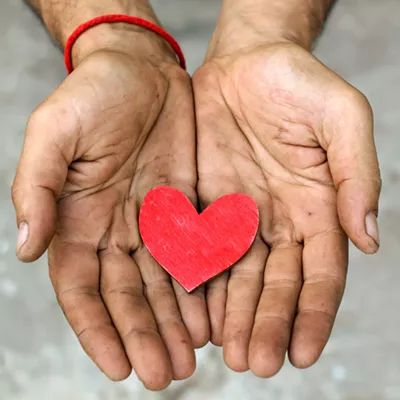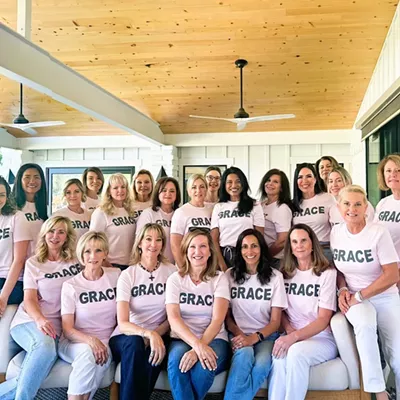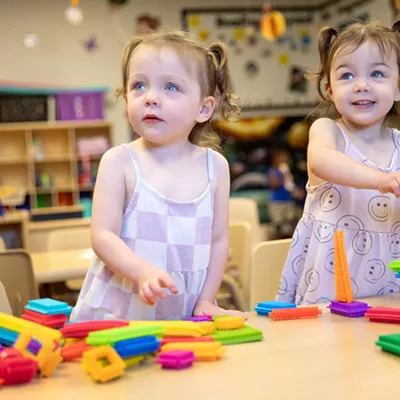Gail Leland made her way from the Pima County Legal Services Building through a crush of people gawking and laughing about the woman on a ledge outside the 23rd floor of Unisource Tower, One S. Church Ave.
It was shortly after 4 p.m., and those who craned could plainly see a large woman in an orange top and white shorts standing, peering, rocking and leaning from near the top of Tucson's tallest building.
Below, as police arrived to block Stone and Church avenues at Pennington, it seemed like a drill. People would come out, from Walgreens, the Bank of America building, Superior Court or Pima County Administration. They'd look up, light up a cigarette and dial a cellphone. Several, from street trash to office workers, laughed and periodically yelled, "Jump."
Some whistled and cheered.
Outside Walgreens, a man in his early 30s smoked the tiny remains of a discarded cigarette and bonded with another man by encouraging suicide. "Don't put your arms out unless you are going to swan dive," he yells.
It was no better a block west, outside Superior Court. Workers and litigants gathered outside. A portly, sandy-haired Pedus security guard on assignment to the county alternated between his radio and his new fan club.
"I'm gonna go push her so we can leave," he said, laughing at himself.
Along the grass on the south side of the Main Library, people took seats to watch. Some women put their youngsters in their laps so they too could view the spectacle.
"I wanted to tell them to get on their knees and pray so that woman could see," Leland said later. "It was more telling about our mental health on the street than up on the top of that building."
The mothers, Leland said, should have taken their children far from the scene, the end of which--just after 6 p.m.--was punctuated by a young woman taking pictures who exclaimed, "That sucks," when the suicide was averted.
Leland knows too well about loss, suffering and pain.
On a summer day in 1981, her 14-year-old son left home and never returned. Richard Leland was a handsome kid. He liked Hot Wheels. He loved to sing and did so at Maxwell Junior High.
"He was just getting interested in girls," Leland said.
Gail Leland had four sons. She was just 32 when Richard was murdered. She had to wait more than three years to get his body from the morgue for burial at Evergreen Cemetery. Richard's killer has never been found.
Days compounded and became weeks, months, years. Gail Leland and her sons have survived decades. She overcame "the terrible amount of fear. You don't know who or why or if they will come back and kill somebody else in your family."
Away from the cruel and callous of the suicide watch, Leland sat in Children's Memorial Park on the north bank of Rillito west of North Oracle Road. It is immaculate, with its clipped grass, monuments and trimmed trees. Birds sing. A busload of children from a nearby school enjoyed the afternoon while others played on swings.
It is peaceful. What was once a dusty ball field wrecked by floods in 1983 is now a refuge as serene and enduring as Leland.
It also is sad. Richard's name is the third in the third column of one of the monuments that bears too many names of Tucson's young.
This park and that memorial are what Gail Leland had until she could bury her son. She now visits the park with her granddaughter, Richard's niece. And for 22 years, Gail Leland, a preschool teacher who speaks softly and without unnecessary adornment, has devoted herself to helping other victims find justice and peace.
First with Parents of Murdered Children and, for nine years, with the non-profit Homicide Survivors, she has led efforts to gain, from prosecutors, lawmakers and judges, the shift in attitude that the only victims in murders are dead.
Along the way in her crusade for victims' rights, she has encountered obstinate and pass-the-buck officials. She calls their bluff. If a local cop or prosecutor complained that their hands were tied by state law, off to Phoenix and the Legislature went Leland.
"As much as it is about justice, it also is about prevention," Leland said. Homicide Survivors conducts workshops in the community and in Juvenile Detention to underscore what crime does to families and loved ones.
Families are now heard. They are notified of proceedings. There are victim compensation funds. Those are among the jobs performed by Homicide Survivors, which operates on a budget of less than $100,000 a year and has tiny office space in the County Attorney's Office. Leland and others conduct three support group meetings a month. They provide clothing and food. They arrange for transportation, including to court proceedings that have been moved out of town. They relieve families of the horror of cleaning homes or cars that were the scene of the crime.
Leland has aided families at the conclusion. She has attended executions of two Tucson killers: Don Jay Miller in 1993 to help the family of Jennifer Geuder, whom Miller repeatedly shot, and the 1996 execution of Daren Bolton, who snatched 2-year-old Zosha Lee Pickett from her midtown home and stabbed her to death 10 years earlier.
Leland fears that victims' families are forgotten after executions. For two years, she served on the Attorney General's Capital Case Commission.
She says her work has been "very satisfying." There are deep moments of pain that are transformed into victories for victims, even small gains.
It is bittersweet.
"I think that I should do something else. But then I meet another survivor."

